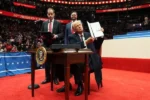In the world of politics, numbers can create big stories! Recently, a famous Iowa pollster named J. Ann Selzer found herself in a tricky situation when former President Donald Trump filed a lawsuit against her and The Des Moines Register newspaper. This was all because of a poll that suggested Vice President Kamala Harris was slightly ahead in the race for the 2024 presidential election. But Selzer and her lawyers are standing strong, claiming that Trump’s lawsuit is not only unfair but also threatens our freedom of speech! Let’s dive into this fascinating battle over polls, free speech, and what it means for our elections.
| Attribute | Details |
|---|---|
| Case Name | Trump vs. J. Ann Selzer and The Des Moines Register |
| Date of Filing | December 2024 |
| Nature of Lawsuit | Accusation of consumer fraud regarding polling results |
| Poll Result | Predicted Kamala Harris had a three-point lead over Trump |
| Actual Election Outcome | Trump won Iowa by about 13 points |
| Primary Argument by Selzer | Trump’s lawsuit threatens First Amendment rights |
| Selzer’s Legal Representation | Attorney Robert Corn-Revere from FIRE |
| Key Legal Claim | No legal basis for ‘fraudulent news’ claims |
| Historical Reference | 1798 Sedition Act was repudiated |
| Expert Opinion | Rick Hasen believes lawsuit is unlikely to succeed |
| Trump’s Other Legal Actions | Includes defamation suits against ABC and CBS |
Understanding the Lawsuit Against J. Ann Selzer and The Des Moines Register
The lawsuit against veteran Iowa pollster J. Ann Selzer and The Des Moines Register has sparked a lot of discussion about free speech and the media. Filed by Donald Trump, the lawsuit challenges a poll that suggested Vice President Kamala Harris was leading him before the 2024 election. Trump claims this poll was part of a conspiracy to mislead voters, but many experts argue that this case threatens the First Amendment rights that protect free speech and reporting.
Selzer’s legal team argues that Trump’s lawsuit is not just unfounded but also a dangerous attempt to redefine what can be considered lawful news reporting. They assert that labeling a poll as ‘fake news’ or ‘fraudulent’ could set a troubling precedent, which might allow politicians to silence unfavorable coverage. This case raises important questions about the right to express opinions and the role of polls in democratic elections.
The Importance of the First Amendment in Political Discourse
The First Amendment is crucial in protecting our right to free speech, especially in political matters. It ensures that individuals can express their opinions and that the media can report on issues without fear of legal consequences. In Selzer’s case, her attorneys emphasize that Trump’s lawsuit could undermine these protections by establishing a dangerous precedent where public figures can sue over unfavorable opinions or reports.
Legal experts point out that allowing such claims could lead to a chilling effect on journalism, where reporters might hesitate to publish legitimate polls and stories. This could ultimately harm the democratic process by limiting the flow of information that voters need to make informed choices. The First Amendment serves to safeguard the marketplace of ideas, which is essential for a healthy democracy.
Implications of the Lawsuit for Future Polling and Elections
This lawsuit has significant implications for how polling and election coverage may evolve in the future. If Trump’s claims were to succeed, it could discourage polling organizations from publishing their findings, especially if they fear legal repercussions for unfavorable results. This could lead to a less informed electorate, as voters would have fewer insights into the political landscape.
Additionally, the lawsuit raises concerns about the potential for political figures to use legal action as a tool to manipulate public perception. As seen in this case, such actions could be viewed as intimidation tactics against the media and pollsters. Ensuring that public discourse remains open and unencumbered by fear of litigation is essential for maintaining a vibrant democracy and fair elections.
Understanding the Legal Landscape of Free Speech in America
The First Amendment of the United States Constitution is a cornerstone of American democracy, protecting the right to free speech. This provision ensures that individuals can express their thoughts, opinions, and even dissent without fear of government reprisal. In the context of J. Ann Selzer’s case, the implications of Trump’s lawsuit challenge the very foundation of this protection, as it attempts to categorize unfavorable polling as ‘fraudulent news.’ Such an assertion could set a precedent that undermines free speech rights across various platforms.
Legal experts emphasize that allowing a lawsuit based on the concept of ‘fake news’ could create a slippery slope, where any unfavorable report or opinion could be challenged in court. This is particularly concerning in the realm of journalism, where the responsibility to report objectively could be compromised. Selzer’s defense argues that Trump’s lawsuit, if upheld, would not only threaten individual speech rights but could also chill the media’s ability to report freely on political matters, which is essential for an informed electorate.
The Impact of Polling on Elections: More Than Just Numbers
Polling plays a critical role in shaping public perception during elections. Polls provide insights into voter sentiment and can influence campaign strategies, media coverage, and, ultimately, voter turnout. The Iowa poll conducted by Selzer indicated that Vice President Kamala Harris had a slight lead, which, while contrary to the election results, reflected a snapshot of voter attitudes at that moment. Understanding how polls are interpreted and misinterpreted is crucial for both voters and candidates.
Moreover, the controversy surrounding Trump’s lawsuit highlights the fragile nature of public trust in polling data. When a candidate challenges the legitimacy of polling results as ‘fraud,’ it can lead to widespread skepticism among voters. This distrust can hinder informed decision-making and create a narrative that delegitimizes the electoral process. Thus, the implications of Selzer’s case extend beyond legal boundaries, affecting how voters perceive the reliability of polls and the integrity of elections.
The Role of Media in Political Discourse
The media serves as a vital conduit between politicians and the public, providing information, analysis, and context to political events. In the case of Selzer and the Des Moines Register, their reporting on polling data is a fundamental aspect of democratic discourse. By presenting diverse viewpoints and interpretations of data, the media empowers voters to make informed choices. Trump’s lawsuit, however, poses a significant threat to this dynamic by attempting to stifle dissenting voices and manipulate the narrative surrounding polling.
Furthermore, the media’s responsibility to report accurately and fairly is paramount, especially during election cycles. Lawsuits targeting media outlets for unfavorable coverage can create a chilling effect, discouraging journalists from pursuing investigative reporting or highlighting controversial issues. The implications of Selzer’s case extend far beyond her and the Register; they challenge the integrity of the media’s role in democracy and raise questions about the future of political reporting in an increasingly polarized environment.
Navigating the Intersection of Law and Journalism
The intersection of law and journalism is a complex realm where the rights of the press often collide with the interests of political figures. Selzer’s defense against Trump’s lawsuit underscores the importance of protecting journalistic integrity and the freedom to report without fear of legal repercussions. The assertion that unfavorable polling constitutes fraud could deter journalists from publishing critical analyses, ultimately leading to a less informed public.
Moreover, the legal framework surrounding defamation and free speech is continually evolving, reflecting societal changes and technological advancements. It is essential for legal scholars and journalists to engage in ongoing discussions about these intersections to safeguard the principles of free expression. Selzer’s case serves as a pivotal moment to examine how the law can support or hinder journalistic practices, shaping the future landscape of media in America.
Frequently Asked Questions
What was the lawsuit about that Donald Trump filed against J. Ann Selzer?
Donald Trump sued J. Ann Selzer because he disagreed with a poll she published. This poll showed that Vice President Kamala Harris was leading him just before the 2024 election.
How did J. Ann Selzer defend herself against Trump’s lawsuit?
Selzer argued that Trump’s lawsuit was against the **First Amendment**, which protects free speech. She believes the lawsuit is silly and should be dismissed by the court.
What does the First Amendment do?
The **First Amendment** is a part of the U.S. Constitution that protects our rights to **free speech, press, and assembly**. It means people can express their thoughts without fear of punishment.
Why did Trump call the poll ‘fake news’?
Trump labeled the poll as ‘fake news’ because he thought it created a false idea that Harris would win the election. He believes it was unfair to him.
What are the consequences of this lawsuit for J. Ann Selzer?
The lawsuit could make it harder for Selzer and the newspaper to publish polls. Trump wants the court to stop them from sharing what he calls ‘deceptive polls’.
What do legal experts think about Trump’s lawsuit?
Many legal experts think Trump’s lawsuit is unlikely to succeed. They believe it is just an attempt to pressure Selzer and the newspaper, rather than a strong legal case.
What happened in the election after the poll was published?
Despite the poll showing Harris leading, Trump actually won the state by about **13 points** in the election, which was a larger margin than the poll suggested.
Summary
Veteran Iowa pollster J. Ann Selzer has urged a federal judge to dismiss a lawsuit filed by Donald Trump against her and The Des Moines Register over a poll predicting a slight lead for Vice President Kamala Harris ahead of the 2024 election. Selzer’s attorneys argue that Trump’s claims threaten First Amendment rights and lack legal merit. The lawsuit, which accuses Selzer of consumer fraud, seeks damages and an order against future polls. Selzer’s filing asserts that no court recognizes a claim for ‘fraudulent news’ and emphasizes that such actions are contrary to established free speech principles.







